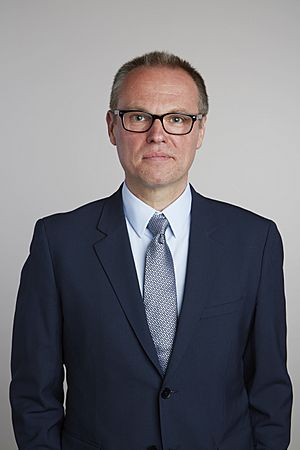Gero Miesenböck facts for kids
Quick facts for kids
Gero Miesenböck
|
|
|---|---|

Miesenböck in 2015
|
|
| Born |
Gero Andreas Miesenböck
15 July 1965 |
| Alma mater |
|
| Known for |
|
| Awards |
|
| Scientific career | |
| Fields | Neuroscience |
| Institutions |
|
Gero Andreas Miesenböck, born on July 15, 1965, is a famous scientist from Austria. He works at the University of Oxford in England. There, he is a special professor of Physiology and leads a center that studies how our brains work.
Contents
Early Life and Education
Gero Miesenböck grew up in Austria. He studied at the University of Innsbruck in Austria and Umeå University in Sweden. He earned his medical degree in 1993. After that, he continued his research training with another scientist named James Rothman.
Amazing Brain Research
Before joining the University of Oxford in 2007, Professor Miesenböck worked at other well-known places. These included the Memorial Sloan-Kettering Cancer Center and Yale University. In 2011, he helped start the Center for Neural Circuits and Behavior.
Controlling Cells with Light: Optogenetics
Professor Miesenböck is known as the person who started a field called optogenetics. He was the first scientist to change nerve cells using DNA. This made it possible to control their electrical activity with light. He put special light-sensing proteins, called opsins, into these cells.
He also used these changes to create animals whose brains had light-sensitive nerve cells. These cells were connected into the animals' natural brain circuits. He showed that he could control the behavior of these animals from a distance using light. This idea of controlling cells with light has become very popular. Many scientists now use and improve this method.
How Sleep Works
Professor Miesenböck also studies why we sleep. He uses tiny fruit flies, called Drosophila melanogaster, for his research. He found that sleep might be linked to how our bodies use energy.
He discovered that special neurons (brain cells) that make us sleep keep track of how much sleep we need. They do this by watching how electrons move inside tiny parts of cells called mitochondria. When we don't get enough sleep, it can cause problems with how these electrons flow. This can create harmful substances in the cells. The sleep-control neurons then use a special sensor to detect these substances. This signal tells the brain it's time to sleep.
Awards and Honors
Professor Miesenböck has received many important awards for his work.
- In 2012, he won the InBev-Baillet Latour International Health Prize. This was for his new ways of using optogenetics to control brain activity and animal behavior.
- In 2013, he shared The Brain Prize with other scientists. He also received the Jacob Heskel Gabbay Award.
- He became a Fellow of the Royal Society in 2015. This is a very high honor for scientists in the UK.
- In 2015, he received the Heinrich Wieland Prize for his breakthrough in optogenetics.
- In 2019, he won the Rumford Prize for his work on inventing and improving optogenetics. He also received the Warren Alpert Foundation Prize that same year.
- In 2020, he was awarded the Shaw Prize in Life Sciences.
- In 2022, he received the Louisa Gross Horwitz Prize.
- Most recently, in 2023, he was honored with the Japan Prize.
He is also a member of several important science groups. These include the European Molecular Biology Organization (EMBO) and the US National Academy of Sciences. In 2017, Trinity College Dublin gave him an honorary doctorate degree.

